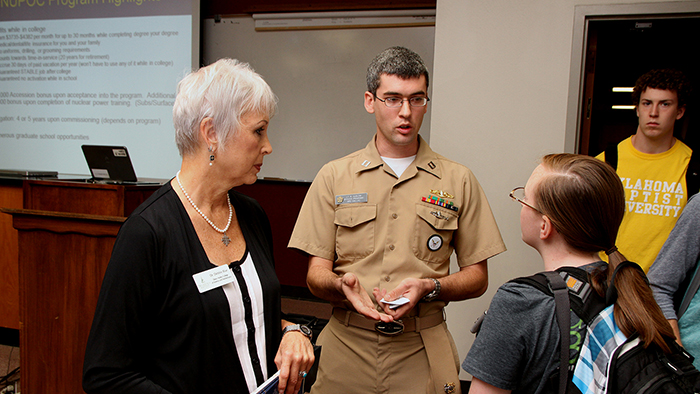U.S. Navy Identifies Math and Science Programs as Tier One
September 19, 2013
The United States Navy recently identified OBU's physics and mathematics majors offered through the James E. Hurley College of Science and Mathematics as the only tier one academic majors in the state of Oklahoma and the North Texas region for the Navy's Nuclear Propulsion Officer Candidate program (NuPOC).
U.S. Navy Lieutenant Ryan Sudlow visited the OBU campus Sept. 9, 2013, to speak to students about opportunities available to them in the NuPOC program. Navy scholarships that provide a monthly military salary, food allowance and housing allowance are available to students who are accepted into the NuPOC program. The highly competitive program prefers students majoring in tier one programs and students may apply as early as their sophomore year of college.
Following graduation, students accepted into the NuPOC program will be able to pursue opportunities in one of four career focus areas including, submarine officer (nuclear submarines), surface warfare officer (nuclear aircraft carriers), naval reactors engineer, and naval nuclear power school instructor.
"We are pleased the Navy has designated these academic programs as tier one majors for the NuPOC Program. The success achieved by our physics and mathematics graduates is evidence of the high level of academic excellence provided by our faculty in the Hurley College of Science and Mathematics," said Dr. Stan Norman, OBU Provost and Executive Vice President for Campus Life. "The recognition of these programs by the Navy is further validation of that academic quality."

U.S. Navy Lieutenant Ryan Sudlow (middle) speaks to Dr. Debbie Blue (left), Dean of OBU's James E. Hurley College of Science and Mathematics, and junior Mathematics major Jaclyn Vanhook about the benefits of the Nuclear Propulsion Officer Candidate program.
Dr. Debbie Blue, dean of the James E. Hurley College of Science and Mathematics, said Dr. Albert Chen, professor of physics, has been a key factor in supplementing the OBU physics program.
"Being identified by the U.S. Navy as a tier one university for their NuPOC program is a testimony to the many factors that contribute to an OBU graduate's physics or mathematics degree," said Blue. "In visiting with Lt. Sudlow, I soon realized that he was very aware of Dr. Chen's NASA research with dust removal on the lens of the Hubble Space Telescope and the way that Dr. Chen engages his students in his own research, as well as research experiences for undergraduates (REUs) in laboratories across the nation."
Blue also noted the value of the one-on-one attention students receive from their professors.
"Our mathematics and physics majors, who often double-major in both subjects, have the opportunity to develop deep and lasting relationships with their professors, who nurture their interests and talents," said Blue. "Our small upper-division classes offer excellent opportunities for nurturing and one-on-one assistance from a professor who is as smart as a rocket scientist -- because he is one," she said, referring to Dr. Chen.
Sudlow said the Navy looks at a variety of sources each year such as U.S. News & World Report and the quality of students coming out of universities, to determine the tier level of the degrees.